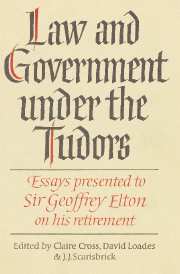Book contents
- Frontmatter
- Contents
- List of contributors
- Preface
- Abbreviations
- Wolsey and the Parliament of 1523
- The Act of Appeals and the English reformation
- Thomas Cromwell and the ‘brethren’
- Henry VIII and the dissolution of the Secular Colleges
- God's law and man's: Stephen Gardiner and the problem of loyalty
- Bondmen under the Tudors
- Wales and England after the Tudor ‘union’: Crown, principality and parliament, 1543–1624
- Robe and sword in the conquest of Ireland
- The principal secretaries in the reign of Edward VI: reflections on their office and archive
- Philip II and the government of England
- Sin and society: the northern high commission and the northern gentry in the reign of Elizabeth I
- The crown, the gentry and London: the enforcement of proclamation, 1596–1640
- Taxation and the political limits of the Tudor state
- Bibliography of the writings of G. R. Elton, 1946–1986
- Index
Sin and society: the northern high commission and the northern gentry in the reign of Elizabeth I
Published online by Cambridge University Press: 06 July 2010
- Frontmatter
- Contents
- List of contributors
- Preface
- Abbreviations
- Wolsey and the Parliament of 1523
- The Act of Appeals and the English reformation
- Thomas Cromwell and the ‘brethren’
- Henry VIII and the dissolution of the Secular Colleges
- God's law and man's: Stephen Gardiner and the problem of loyalty
- Bondmen under the Tudors
- Wales and England after the Tudor ‘union’: Crown, principality and parliament, 1543–1624
- Robe and sword in the conquest of Ireland
- The principal secretaries in the reign of Edward VI: reflections on their office and archive
- Philip II and the government of England
- Sin and society: the northern high commission and the northern gentry in the reign of Elizabeth I
- The crown, the gentry and London: the enforcement of proclamation, 1596–1640
- Taxation and the political limits of the Tudor state
- Bibliography of the writings of G. R. Elton, 1946–1986
- Index
Summary
The act books of church courts are among the more strikingly repulsive of all the relics of the past – written in cramped and hurried hand, in very abbreviated and technical Latin, often preserved (if that is the right word) in fairly noisome conditions, ill-sorted and mostly unlisted, unindexed and sometimes broken in pieces. Cause papers, where they exist, are likely to be found in total confusion and with no guide to their contents… Only young scholars, still enthusiastic, physically strong, and possessed of a sound digestion, are advised to tackle these materials. On the other hand, they offer a most promising field of research because they illumine the history of church and people in ways that no other source can. They take one to the realities. This is because of the wide range of cases that came before these courts, and because that range touched the human being so very near his personal centre.
Little has changed in the nineteen years since Professor Elton wrote these words, and, their custody apart, all his strictures apply to – the sixteenth-century ecclesiastical court records of the province of York. Yet, as he rightly maintains, these documents give an insight into the mores of a society not obtainable elsewhere. Unlike the southern province which lost the records of its chief prerogative court on the outbreak of the civil war, York has retained a long run of high commission act books, to all intents and purposes complete for the reign of Elizabeth.
- Type
- Chapter
- Information
- Law and Government under the TudorsEssays Presented to Sir Geoffrey Elton, pp. 195 - 210Publisher: Cambridge University PressPrint publication year: 1988



